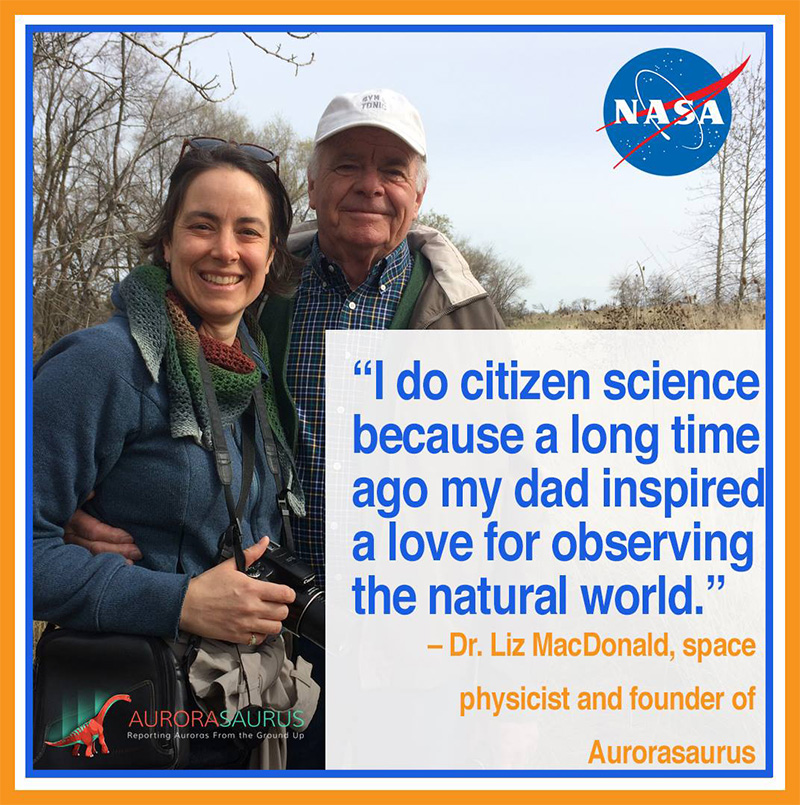Aurorasaurus with Dr. Liz MacDonald
Details
Online Public
Type: Special Event
Keywords: Aurora Citizen Science Public Event
Held on: Aug 05, 2022 (Fri) at 07:00 PM to Aug 05, 2022 (Fri) at 08:00 PM
Online Location: Please sign in to see online meeting location.
Speaker: Dr. Liz MacDonald
Location: Physics/Astronomy Auditorium (PAA), Room A102, Seattle, Washington
Event Coordinator: Aaron Yoon (he/him)
Overview
Learn more about the beautiful auroral night lights seen over the higher latitudes of our planet. Dr. Liz MacDonald is a NASA astrophysicist and WA native who studies the aurora. She also founded Aurorasaurus, a citizen science project that connects what amateur sky watchers capture in photos with the scientists who study aurora.
Free in-person tickets (limited): https://www.eventbrite.com/e/aurora-citizen-science-project-aurorasaurus-tickets-390827755337
Seattle Astronomical Society will also be live streaming this program.
Members log in for link at 7 PM.
Public, please request link from cgshwork@gmail.com
Questions? education@seattleastro.org
Map
More Information

My research has focused on experimental particle measurement techniques and data analysis in the magnetosphere and ionosphere for the last 15 years. Currently I am a Co-I on the Helium, Oxygen, Proton, and Electron Spectrometer on the NASA Radiation Belts Storm Probe mission. At Los Alamos National Laboratory, I was the PI for the Z-Plasma Spectrometer on the DOE Space and Atmospheric Burst Reporting System (SABRS) geosynchronous payload. I also led the Innovative Research and Integrated Sensing (IRIS) team in my group (www.lanl.gov/projects/iris). In the recent past I've led the DoE-funded Technology Infusion Project entitled Modular Advanced Space Environment Instrumentation (from 2009-2011) and served as the PI for the Advanced Miniaturized Plasma Spectrometer on the DOE SABRS Validation Experiment payload (2007-2008).
I have a blend of expertise in both instrument development and data analysis and interpretation that comes from sounding rocket and satellite instrumentation experience. This experience ranges over the complete cycle of instrument production, including design and modeling, integration and testing, calibration, satellite operations, and in situ scientific data analysis. As a result, I'm very interested in instrument technology development, basic magnetospheric science, and space situational awareness national priorities. My specific research interests include wave-particle interactions and the effect of plasma on radiation belt dynamics, mapping, coupling, and transport between the ionosphere and the inner magnetosphere, and the impact of heavy ions on geomagnetic storm processes.
I received my Masters and PhD degrees from the University of New Hampshire. I received a Bachelor's in Physics from the University of Washington, largely funded by a NASA Space Grant scholarship.
Announcements
Other Special Event Events
-
Previous Special Event
-
MAY26
Goldendale Sky Village
Thu at 12:30 PMSAS Members OnlyMembers of the SAS have been invited to a special event hosted by the Goldendale Sky Village community in May. The number is limited. Contact the event coordinator if you are interested in attending. Contact john.mclaren@seattleastro.org for more information about GSV. Attendance is limited to current SAS members and immediate family only. No pets allowed.
over 2 years ago
Members of the SAS have been invited to a special event hosted by the Goldendale Sky Village community in May.26-31st.
Goldendale Sky Village is located in very dark skies in eastern Washington near the town of Goldendale. It is a community dedicated to serious amateur astronomy. There are currently 52 members, each having purchased a lot that they use for observing.
The number allowed for this event is limited.
Contact john.mclaren@seattleastro.org for more information.
- Only SAS members and immediate family allowed
- No pets
0 attending
-
Next Special Event
-
APR15
International Dark Sky Week
Sat at 12:00 AMOnline Open to PublicDISCOVER THE NIGHT APRIL 15-22 It may seem harmless, but light pollution has far-reaching consequences that are harmful to all living things. Effectove outdoor lighting reduces light pollution, leading to a better quality of life for all. The dark sky movement is working to bring better lighting to communities around the world so that all life can thrive. Join us this International Dark Sky Week, April 15-22 to learn more about the movement, and discover the night where you ... more
almost 2 years ago
International Dark Sky Week starts soon! —
International Dark Sky Week starts shortly on Apr 15 (Sat) at 12:00 AM.
1 attending





